
Biosafety and Health
Scope & Guideline
Exploring the intersection of biosafety and public health.
Introduction
Aims and Scopes
- Biosafety and Biosecurity:
Focuses on measures to prevent biological hazards in laboratories and healthcare settings, ensuring safe handling of pathogens and minimizing risks of laboratory-acquired infections. - Infectious Disease Surveillance and Management:
Covers methodologies and technologies for monitoring and controlling infectious diseases, including genomic surveillance, environmental monitoring, and public health interventions. - Pathogen Characterization and Vaccine Development:
Explores the genetic and biological characteristics of pathogens to inform vaccine design and therapeutic strategies, particularly in response to emerging infectious diseases. - Antimicrobial Resistance Research:
Investigates the mechanisms and epidemiology of antimicrobial resistance, promoting strategies for containment and management in both clinical and environmental contexts. - One Health Approach:
Emphasizes the interconnectedness of human, animal, and environmental health, advocating for integrated strategies to combat zoonotic diseases and promote overall public health.
Trending and Emerging
- Cyberbiosecurity:
An increasing number of studies are addressing the intersection of cybersecurity and biological data, highlighting the importance of protecting sensitive genomic information from cyber threats. - Artificial Intelligence in Health Monitoring:
The application of AI technologies for predictive modeling and outbreak surveillance is gaining momentum, showcasing its potential in enhancing biosafety measures. - Post-Pandemic Health Dynamics:
Research focusing on the long-term health effects of COVID-19, including mental health implications and the management of co-infections, has become a prominent theme. - Novel Vaccine Platforms and Therapeutics:
There is a growing emphasis on innovative vaccine technologies and therapeutic strategies, particularly those targeting emerging viral pathogens like SARS-CoV-2 and monkeypox. - One Health Interventions:
The integration of human, animal, and environmental health perspectives in research is increasingly prevalent, reflecting a holistic approach to combatting infectious diseases.
Declining or Waning
- Traditional Laboratory Techniques:
There is a noticeable decline in papers focusing on traditional laboratory techniques for pathogen detection, as newer, more efficient molecular methods gain traction. - Generalized Epidemiological Studies:
General epidemiological studies without a specific focus on emerging pathogens or antimicrobial resistance are becoming less common, as the journal shifts towards more targeted research. - Environmental Pathogen Studies:
Research centered solely on environmental studies of pathogens without a connection to human health or biosafety implications is less frequently published, reflecting a trend toward more integrated research.
Similar Journals
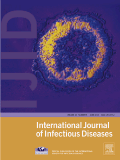
INTERNATIONAL JOURNAL OF INFECTIOUS DISEASES
Connecting researchers to combat infectious threats.INTERNATIONAL JOURNAL OF INFECTIOUS DISEASES, published by ELSEVIER SCI LTD, stands as a leading platform in the realm of infectious diseases, contributing significantly to the global understanding of this critical field. With an impressive impact factor, the journal maintains a distinguished Q1 ranking across various categories, including Infectious Diseases, Medicine (miscellaneous), and Medical Microbiology, demonstrating its high relevance and influence among contemporary research. Since its inception in 1996, it has embraced an Open Access model, allowing for wider dissemination of essential research findings that can inform public health policies and clinical practices. With a commitment to advancing scientific knowledge, this journal is not only a vital resource for researchers and professionals but also serves as an invaluable educational tool for students interested in the complexities of infectious diseases and their management. For those looking to stay at the forefront of research and innovation in this field, the INTERNATIONAL JOURNAL OF INFECTIOUS DISEASES is an indispensable resource.
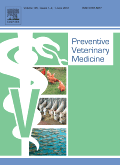
PREVENTIVE VETERINARY MEDICINE
Enhancing food animal health through rigorous scientific insights.PREVENTIVE VETERINARY MEDICINE, published by Elsevier, is a premier academic journal dedicated to advancing the field of veterinary science, with a particular focus on the prevention of diseases in food animals. With an impressive impact factor that reflects its stature in the academic community, this journal is categorized in the Q1 quartile across both Animal Science and Zoology and Food Animals categories, underscoring its significance in agricultural and biological sciences. Established in 1982, the journal is known for its rigorous peer-reviewed articles and research insights that contribute significantly to veterinary epidemiology, herd health management, and disease prevention strategies, fostering a closer connection between veterinary practitioners and researchers. By offering a platform for high-quality research that enhances animal health and productivity, PREVENTIVE VETERINARY MEDICINE serves as an essential resource for researchers, veterinarians, and students aiming to stay at the forefront of veterinary innovations and practices.

Lancet Microbe
Connecting Science and Solutions in MicrobiologyThe Lancet Microbe is a leading peer-reviewed journal published by ELSEVIER, focused on advancing research in the fields of infectious diseases, microbiology, and virology. Since its inception in 2020, this open-access journal has rapidly achieved a prestigious reputation, evidenced by its impressive rankings in the Scopus Ranks, where it holds positions within the top 10 in multiple categories and boasts high percentiles, reflecting the impact and relevance of its published works. With a quarterly publication schedule, the Lancet Microbe aims to disseminate critical findings and foster innovation within the scientific community, providing a platform for researchers and professionals to share their significant contributions. The journal is committed to facilitating knowledge exchange and accessibility, making it an essential resource for academicians and practitioners dedicated to addressing global health challenges.

IJID Regions
Advancing global health knowledge through open access research.IJID Regions is a pioneering open access journal published by Elsevier, focusing on the critical fields of epidemiology, infectious diseases, and public health. Established in 2021, the journal aims to provide a platform for disseminating high-quality, innovative research that addresses pressing health issues and informs evidence-based practices in communities around the globe. With its impact factors reflecting a Tier Q2 and Q3 ranking in various medical subcategories on the Scopus platform, IJID Regions is positioned as a valuable resource for researchers, health professionals, and policy-makers striving to enhance public health outcomes. This journal not only champions open access since its inception, promoting the free flow of information, but also welcomes contributions that shed light on contemporary challenges in environmental and occupational health. Its commitment to fostering dialogue and collaboration in the health sciences is paramount, making it an essential read for those engaged in advancing public health knowledge and initiatives.

Infectious Diseases and Clinical Microbiology
Fostering collaboration in the fight against infectious agents.Infectious Diseases and Clinical Microbiology is a pivotal journal dedicated to advancing our understanding of infectious diseases through rigorous scientific research and clinical practices. Published by DOC DESIGN INFORMATICS CO LTD, this journal serves as a vital platform for researchers, healthcare professionals, and students keen on enhancing their knowledge of microbiological sciences and the clinical implications of infectious agents. With an ISSN of 2667-646X, it aims to disseminate significant findings in the field, enriching the scholarly dialogue surrounding infectious diseases. While currently operating under a traditional access model, the journal encourages global collaboration and knowledge sharing, striving to make a meaningful impact in tackling the challenges posed by infectious diseases. Its content aims to bridge the gap between laboratory research and clinical application, making it an essential resource in the contemporary landscape of global health.
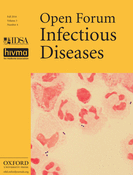
Open Forum Infectious Diseases
Pioneering research for a healthier tomorrow.Open Forum Infectious Diseases (ISSN: 2328-8957; E-ISSN: 2328-8957) is a leading open-access journal published by Oxford University Press, dedicated to advancing the field of infectious diseases. Since its inception in 2014, the journal has provided a platform for researchers to disseminate impactful findings in a rapidly evolving domain, achieving a remarkable Q1 ranking in both the Infectious Diseases and Oncology categories as of 2023. The journal encourages rigorous and innovative research, contributing significantly to global health discussions and informing best practices in clinical settings. As an open-access journal, it ensures that its content is accessible to a wide audience, fostering collaboration and knowledge sharing among researchers, professionals, and students alike. Positioned in the heart of the United States, Open Forum Infectious Diseases serves as a critical resource for the academic community, and its continued commitment to quality and relevance secures its status as an essential publication in the field.

Infectious Disease Reports
Bridging gaps in understanding infectious diseases worldwide.Infectious Disease Reports is a premier open-access journal published by MDPI, dedicated to advancing the field of infectious diseases. Since its inception in 2009, this journal has established itself as a significant platform for disseminating cutting-edge research, reviews, and case studies, critical for global health. With a commendable Q2 ranking in the category of Infectious Diseases and a Scopus rank of #140 out of 344, it is recognized for its impactful contributions to medical research, holding a 59th percentile in its field. The journal aims to provide comprehensive insights into various dimensions of infectious diseases, ranging from epidemiology to novel treatment modalities. As an open-access publication, Infectious Disease Reports ensures that its articles are freely available to a wide audience, fostering collaborative efforts among researchers, healthcare professionals, and students worldwide. With its ongoing commitment to excellence, the journal plays an essential role in shaping the future of infectious disease research.
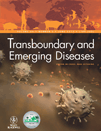
Transboundary and Emerging Diseases
Advancing global health through innovative research.Welcome to Transboundary and Emerging Diseases, a prestigious journal published by WILEY-HINDAWI. With its ISSN of 1865-1674 and E-ISSN of 1865-1682, this journal plays a pivotal role in the dissemination of high-quality research within the fields of Immunology, Microbiology, Medicine, and Veterinary Sciences. Based in the United Kingdom, this open-access journal stands out with a remarkable impact factor, reflecting its category quartiles in 2023, where it secured Q1 rankings across multiple disciplines, including a remarkable rank of #3 out of 194 in Veterinary General, placing it in the top 2% of its field. With coverage spanning from 2008 to 2024, Transboundary and Emerging Diseases provides a vital platform for researchers, professionals, and students to explore emerging threats to global health and animal welfare. The journal's commitment to open access ensures broad availability of cutting-edge research, fostering collaboration and knowledge sharing in pursuit of innovative solutions to transboundary diseases. Join a community dedicated to advancing the science and practice within this crucial area of study.
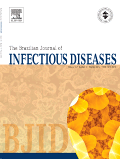
Brazilian Journal of Infectious Diseases
Fostering collaboration for impactful health solutions.The Brazilian Journal of Infectious Diseases, published by Elsevier Brazil, is a premier open-access journal dedicated to advancing research and clinical practice in the field of infectious diseases. Since its inception in 2001, this journal has been pivotal in disseminating innovative studies and reviews that inform healthcare professionals and researchers alike. With an impressive impact factor reflected by its ranking in the second quartile for Infectious Diseases and third quartile for Medical Microbiology in 2023, the journal ranks #127 out of 344 in medicine – infectious diseases and #61 out of 140 in medical microbiology, showcasing its reputable standing in the scientific community. The Brazilian Journal of Infectious Diseases invites contributions that highlight significant findings, novel methodologies, and critical reviews aimed at enhancing patient care and public health initiatives. With an international readership and a focus on pressing issues in infectious diseases, it serves as an essential platform for knowledge exchange and collaboration among scholars and practitioners across Brazil and beyond. By reinforcing the importance of open access to scientific literature, this journal not only promotes transparency but also enhances the global discourse surrounding infectious diseases.

New Microbes and New Infections
Empowering healthcare through cutting-edge microbial research.New Microbes and New Infections is an esteemed peer-reviewed journal published by Elsevier Sci Ltd that has been a prominent platform for disseminating groundbreaking research in the fields of Infectious Diseases and Microbiology since its establishment in 2013. With an impressive Open Access model, this journal ensures that vital research findings are readily accessible to researchers, healthcare professionals, and academics worldwide. Positioned in the Q2 category for Infectious Diseases and Q3 for Microbiology in 2023, it reaches a significant global audience, as demonstrated by its high Scopus rankings—#44 out of 344 in Medicine: Infectious Diseases, and #34 out of 182 in Immunology and Microbiology. The journal aims to inspire new ideas and foster collaborations by publishing high-quality research focused on novel microbes and infections, thus playing a crucial role in advancing science and public health in an era where understanding infectious agents is more vital than ever.